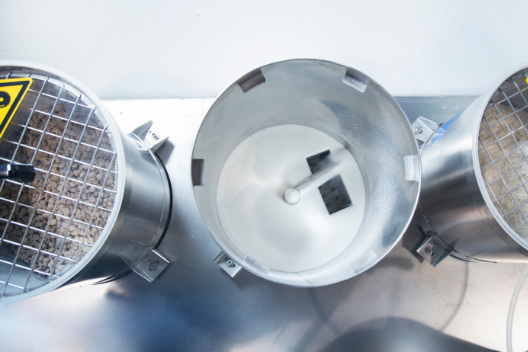Pneumatic conveyors and handling systems play a crucial role in various industries, especially when it comes to moving bulk materials and powders efficiently and safely

The importance of pneumatic conveyors and handling in the food industry can be understood through several key aspects:
- Hygiene and Sanitation: The food industry places a premium on hygiene and sanitation. Pneumatic conveyors can be designed with sanitary features, such as stainless steel construction and easy-to-clean surfaces, to ensure that the transported food products remain uncontaminated during the handling process.
- Prevention of Cross-Contamination: Pneumatic conveying systems prevent cross-contamination by isolating different food products during transport. This is crucial for ensuring that allergens, pathogens, or flavors from one product do not mix with another, which is particularly important in facilities producing multiple food products.
- Dust Control: Many food products are in powder or granular form and can generate airborne dust. Pneumatic conveyors are effective at controlling dust emissions, reducing the risk of inhalation hazards for workers and maintaining a clean processing environment.
- Gently Handling Delicate Products: Pneumatic conveyors can handle delicate food products, such as powders, spices, and fragile ingredients, without damaging them. The gentle conveying action ensures the integrity of the food product, preserving its quality and appearance.
- Precise Metering and Dispensing: In food processing, precise metering and dispensing of ingredients are crucial for product consistency. Pneumatic conveyors can accurately deliver ingredients to mixing or blending processes, ensuring that recipes are followed precisely.
- Reduction of Manual Labor: Automated pneumatic conveying systems reduce the need for manual labor in material handling, minimizing the risk of human error and contamination. This helps maintain food safety standards and consistency.
- Improved Efficiency: Pneumatic conveying systems can transport ingredients and products efficiently within a food processing facility. This efficiency leads to faster production processes, reduced downtime, and increased throughput.
- Versatile Handling of Food Products: Pneumatic conveyors can handle a wide variety of food products, including grains, flours, sugars, spices, dairy products, and more. They are versatile tools that can accommodate different types of food materials and processing requirements.
- Compliance with Food Safety Regulations: Food safety regulations are stringent, and pneumatic conveyors can be designed to meet or exceed these regulations. Their sanitary construction, easy cleaning features, and prevention of contamination help food manufacturers maintain compliance.
- Environmental Considerations: Pneumatic conveying systems can be environmentally friendly. They often require less energy compared to mechanical conveying systems and can be designed for closed-loop systems to reduce material waste and spillage.
In summary, pneumatic conveyors and handling systems play a vital role in the food industry by ensuring the safe, hygienic, and efficient movement of food products throughout the production process. They contribute to food safety, quality control, and compliance with industry regulations, making them essential tools for food manufacturers seeking to produce high-quality and safe products.
At Gashor we are a driving force behind seamless material handling. With cutting-edge pneumatic conveyors and handling solutions, we move your product with precision and speed.
Do you want more information? https://www.gashor.com/en/contact/
